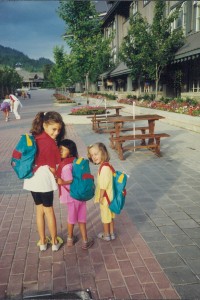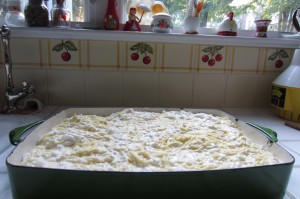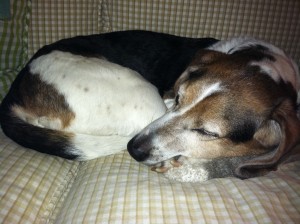IN SEARCH OF JOLLY GEORGE: OUR FAMILY GLOSSARY
If our family were contestants on a TV know-your-family game show, and the emcee were to ask, “Who is least likely to be a pest?” we would all shout “Emy!” The rest of us can be annoying, not least of all yours truly, but never Emy.
When my three daughters were little, however, we commonly referred to Emy as “Emy the P.” You never heard Lizie the P or Beanie the P, even though they too were often P’s.
I had coined the term “P” because I knew from the volumes I’d read about child rearing that you weren’t supposed to label your kids, as in Emy the Pest. So, I introduced the moniker, Emy the P.
Realizing now, of course, that P was indeed a label, I feel really bad about this. The funny thing is that years later a discussion came up in which Eliza said she thought it was spelled Emy the Pea.
That got me thinking about the family glossary and the fact that I never got an explanation from my mom before she died about an expression she had used as far back as I remember: Jolly George.
It went like this: Suppose she accidentally broke a dish. She would say, “Oh, that’s just George, Jolly George”
Wikipedia has a George Jolly, a 17th century impresario, but no Jolly George. And on LinkedIn there are 24 Jolly Georges, but those Georges are not my mom’s Jolly George.
Just as we all have funny names we call our dogs, and our kids for that matter, we have family vocabularies that would make no sense to those outside the family. To help my own kids have a record of the meanings and etymology of our family’s unique language, I’ve compiled a glossary.
So, my a-door-bells, this is for you . . .
- Wonk’y, wonk’y = y’know, y’know (“wonk’y” is y’know in backwards talk)
- Hilario = hilarious
- Youdledoodle = you
- Noodoopoodoo = noodle pudding (or kugel)
- Roo = wraparoo = wrap, as in it’s a roo, a wraparoo, we’re finished with this
- TWFW = Too Weird for Words. When Dad ran for Congress I bought 5 large buttons that I covered with bright yellow paper–decorated with red, silver and blue stars–on which I printed Steve Orlins for Congress. We all pinned these to ourselves on Sunday mornings and went to diners to shake hands with voters. In the middle of one handshake, I noticed my covering had fallen off and I was wearing a button that said Too Cute for Words with a funny cartoon character. In the family vernacular, Too Weird for Words became more useful and we shortened it to TWFW.
- Bud = bath (The u is pronounced like the “oo” in book; I always thought this was Yiddish, but I think it’s part of the bastardized Yiddish my parents spoke.)
- Buddie = bath (nickname for bud)
- George, jolly George = great, just great (sarcastic)
- Snuffy Smith = Snuffy Smithereen = Snuffleupagus = stuffy nose, as in “Are you a Snuffy Smith?” (Snuffy Smith was a hillbilly character, with a wife named Loweezy, from the funny pages when I was growing up)
- P = pest
- A Pete = a sleepy person, as in “You’re a Sleepy Pete.”
- Jack = Jill = Jackeroo = a hungry person, derived from Hungry Jack, brand name of biscuits made by the Smucker Company (for example, “Are you a Jack?”)
- Duzi = Tummy ache (duzi is Mandarin for stomach)
- Xiux = Rest or nap (Chinglish; xiuxi is Mandarin for rest, proper pronunciation I believe is “showshee,” we just say shoosh)
- A-door-bell = adorable
- Kiss-a-kep = Kiss-a keppie = lips to your forehead to see whether you have a fever, as in “Let me kiss-a-kep.” (Kep or keppie
derives from keppele, the Yiddish word for “little head.”)
- Cas-A-E-I-O-U-ey = Casey, derived from when cousin T was little and called him “Case-A.”
- Buzzer = Buzz = Nickname for Emy; when we lived in Hong Kong, our doorbell was more like a buzzer and we loved the way Emy said “Buzzah” and we’d constantly ask her to say “buzz the buzzah.”
- Hin ja bin ja bon ja bet . . . cha BEATCHA! = What I used to say to add drama and encouragement to get you upstairs to bed.
- Bananas and milk: Bedtime reminds me of when you would tell me you were hungry after getting into bed, and I would say, “The only thing you can have is bananas and milk,” knowing, if you were willing to eat that, you must really be hungry. I recently read that having bananas and milk helps you relax before going to bed (smile).
What are some expressions in your family glossary? Please comment, the way you did about all the funny names you call your pets!
Unrelated, some of my recent articles on Home Goes Strong:
- Imagine having Martha Stewart to dinner! Awesome Entertaining Tips From One Who Did!
- And share with any vegan friends this Prize-Winning Chili Recipe as a Thanksgiving Turkey Alternative.
- 10 Ways Twitter Can Help Plan Thanksgiving
I’m excited about my brand new Facebook Fan page. Please visit by clicking the button above on the right, and become a fan!



Leave a Reply